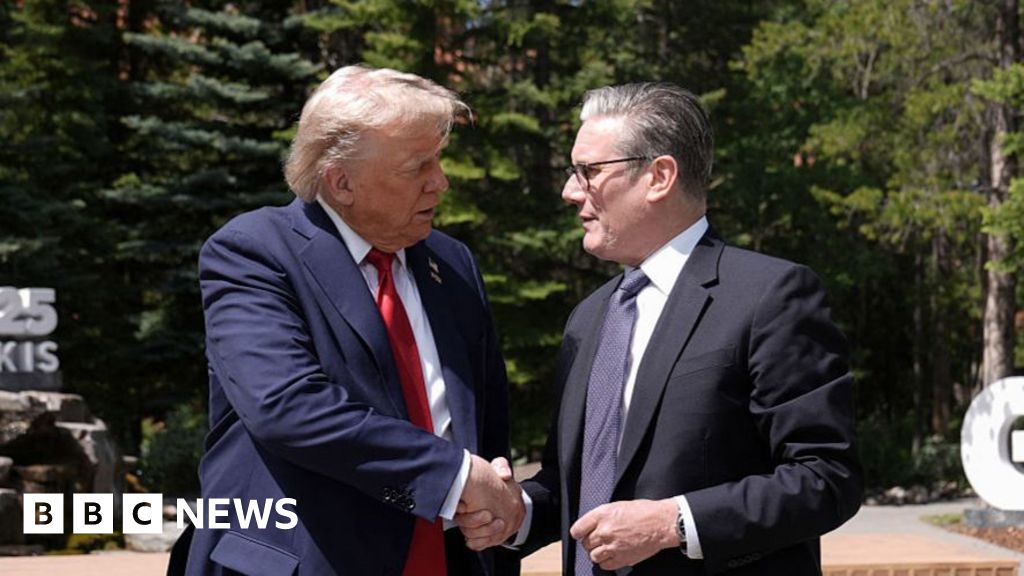A deal to cut import tariffs between the US and UK has come into force, giving British car makers preferential access to the world's biggest consumer market. It will allow UK motor manufacturers to sell up to 100,000 vehicles to the US at a tariff of 10% - a big advantage over international competitors - while tariffs on UK aerospace exports have been cut to zero In return, the UK will scrap tariffs on US ethanol imports - a move which the British bioethanol industry says will make it impossible for it to compete. However, UK steel and aluminium remain subject to a 25% tariff, which could double to 50% if the UK and US do not reach a deal by deadline day on 9 July. The agreement, which was signed at the G7 summit earlier this month, cuts some of the sweeping tariffs imposed by US President Donald Trump that sent global markets into chaos in April. UK Prime Minister Sir Kier Starmer called it a "historic deal" which would safeguard key industries vital to the British economy. In a Fox News interview aired on Sunday, Trump said he was unlikely to extend the 9 July deadline he has imposed on countries to secure deals with the US to avoid the higher tariffs. Under the US-UK agreement, UK carmakers can sell up to 100,000 cars a year to the US with a 10% tariff, down from 27.5%. Tariffs on the UK aerospace sectors, too, will be removed. The Business and Trade Secretary, Jonathan Reynolds, said the reducing tariffs would save sectors "hundreds of millions each year" and safeguard "thousands of jobs". However, details on steel and aluminium tariffs have yet to be finalised. They remain subject to a 25% tariff, which could double to 50% if the UK and US do not reach a deal by the deadline. For its part, the UK will scrap a 20% tariff on US beef imports and raise the quota to 13,000 tonnes. Up to 1.4 billion litres of US ethanol can also arrive in the UK tariff-free, doing away with the 19% tariff rate on US ethanol shipments previously. The UK-US trade settlement goes live even as the rest of the world braces for the looming tariff deadline - a date President Trump has indicated is unlikely to be postponed, though he hasn't ruled it out entirely. "I don't think I'll need to," he told Fox News, adding, "I could, no big deal". In April, Trump imposed sweeping reciprocal duties on most trading partners worldwide but paused the tariffs days later to allow for negotiations. On Friday, Trump said he had called off negotiations with Canada owing to the country's digital services tax. However, on Sunday, Canada's finance ministry said it had rescinded its digital services tax in a bid to advance trade talks. The nations share among the largest trading relationships globally, involving more than $900bn (£656bn) of goods and services in 2024. Other countries are also in the queue to broker deals with the US. Thailand's commerce minister Pichai Naripthaphan has said the country will hold talks with the US, its largest trade partner, with hopes of reducing the tariffs imposed on Thai goods from 36% to as low as 10%.
UK-US tariff deal begins but still no news on steel
TruthLens AI Suggested Headline:
"UK and US Implement Tariff Agreement Benefiting Automotive and Aerospace Sectors"
TruthLens AI Summary
The newly implemented UK-US tariff deal marks a significant shift in trade relations, particularly benefiting British car manufacturers. Under this agreement, UK motor manufacturers are now allowed to export up to 100,000 vehicles to the United States at a preferential tariff rate of 10%, a considerable reduction from the previous rate of 27.5%. This preferential access positions British carmakers favorably against international competitors in the world's largest consumer market. Additionally, tariffs on UK aerospace exports have been eliminated entirely, further enhancing the competitive landscape for British industries. In exchange, the UK has agreed to remove tariffs on US ethanol imports, a decision that has raised concerns within the British bioethanol industry, which argues that this move could undermine its competitiveness in the domestic market. The Business and Trade Secretary, Jonathan Reynolds, emphasized that these tariff reductions could save various sectors hundreds of millions annually and help preserve thousands of jobs across the UK economy.
Despite the positive developments for the automotive and aerospace sectors, the agreement leaves significant uncertainties regarding UK steel and aluminium exports, which continue to face a 25% tariff. This tariff could potentially double to 50% if no further agreement is reached by the impending deadline of July 9. UK Prime Minister Sir Kier Starmer hailed the deal as a historic achievement, highlighting its potential to safeguard key industries. Meanwhile, US President Donald Trump has expressed that he is unlikely to extend the deadline for countries to negotiate tariff agreements, which adds pressure on the UK to finalize terms regarding steel and aluminium. The broader context includes ongoing negotiations with other nations, as countries like Canada and Thailand seek to navigate the new tariff landscape established by the US. As trade tensions remain high globally, this deal signifies a pivotal moment in UK-US economic relations while raising questions about the future of the steel sector amid ongoing negotiations.
TruthLens AI Analysis
You need to be a member to generate the AI analysis for this article.
Log In to Generate AnalysisNot a member yet? Register for free.
